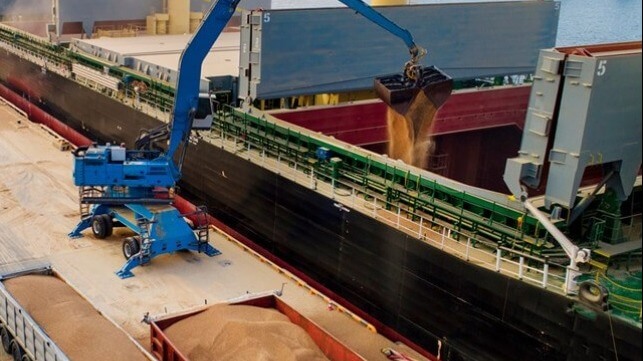Three Ukrainian Ports Reopen for Grain Shipment Under UN-Brokered Deal

After more than two months of difficult negotiations brokered by the United Nations and Turkey, an agreement was signed in Istanbul on Friday that lays the groundwork for reopening three Ukrainian Black Sea ports for critical gain shipments. UN officials said Russia and Ukraine established elements such as the ports involved, the establishment of a monitoring center in Istanbul, and inspections routines for the vessels, with both sides agreeing not to attack or hinder the movement of the vessels.
“The initiative we just signed opens a path for significant volumes of commercial food exports from three key Ukrainian ports in the Black Sea, Odesa, Chernomorsk, and Yuzhny,” said UN Secretary General Antonio Guterres. “The shipment of grain and food stocks into world markets will help bridge the global food supply gap and reduce pressure on high prices.”
The UN officials said they plan to start work immediately to implement the initiative. Tomorrow they will take the first steps to establish the Joint Coordination Center to be located in Istanbul which they said will be the heart of the operation. Turkey played a key role in negotiations as it has maintained relations with both Russia and Ukraine and offered to provide monitoring and inspection to meet Russia’s demands to assure the ships would not be used to transport military equipment into Ukraine.
Under the plan, the UN reported that Ukrainian pilots will be used to guide the ships in and out of the ports and through the mined waters. The ships will follow a prescribed route out of Ukrainian waters and transit the Bosphorus to a Turkish port where they will again be inspected before heading into the world markets.
In addition to the agreement for inspections to ensure the vessels are not used to transport military equipment, Russian also demanded a smoothing of the limits on its shipping in the region. Russia was seeking guarantees to ease the movement of its foodstuffs and fertilizer with guarantees that its ships would also have free passage. The UN reports that a second, separate agreement was being signed to address these points.
The IMO also played a role in the development of what it is calling humanitarian corridors. In March the IMO Council requested the UN Secretary General’s collaboration to assist in establishing and maintaining the safe corridor in the Black Sea and the Sea of Azov.
“The safety of ships and seafarers remains my top priority. IMO instruments, including the International Ship and Port Facilities Securite, underpin this agreement for safe and secure shipping through the Black Sea,” said IMO Secretary-General Kitack Lim during the signing ceremony in Istanbul. “I commend the efforts of all involved, particularly the IMO Member States - Russian Federation, Turkey, and Ukraine."
Estimates are that there are as many as 20 million tons of grains stuck at the port of Odesa and multiple ships have remained stranded anchored off the port since the invasion began in late February. Historically, Ukraine and Russia export approximately 75 percent of the grain grown in the region with 90 percent moving by ship. The UN had warned the blockade of the ports could push 49 million people toward famine, especially in the emerging world.

that matters most
Get the latest maritime news delivered to your inbox daily.
Analysts at S&P Global Market Intelligence cautioned that even though the agreement has been reached, it could take a few weeks to months to resolve concerns for the Black Sea routes to resume. “Danube River ports will likely remain a safe and attractive option for grain exports in the near term,” said Daejin Lee, Lead Shipping Analyst at S&P Global Market Intelligence. In the early stage, Lee predicts that small domestic vessels will operate increasing capacity but the efficient shipment of grain out of Ukraine requires larger bulk carriers which will likely not return until insurance and safety issues are resolved.
The UN said it expects it will take a few weeks to fully implement the current agreements, but they are aiming to restore grain shipments to pre-war levels. Speaking to reporters after the signing ceremony, UN officials said the goal was for five million metric tons of grain exports a month. The initial agreement lasts 120 days but is renewable and the UN said they did not anticipate it would stop any time soon.
